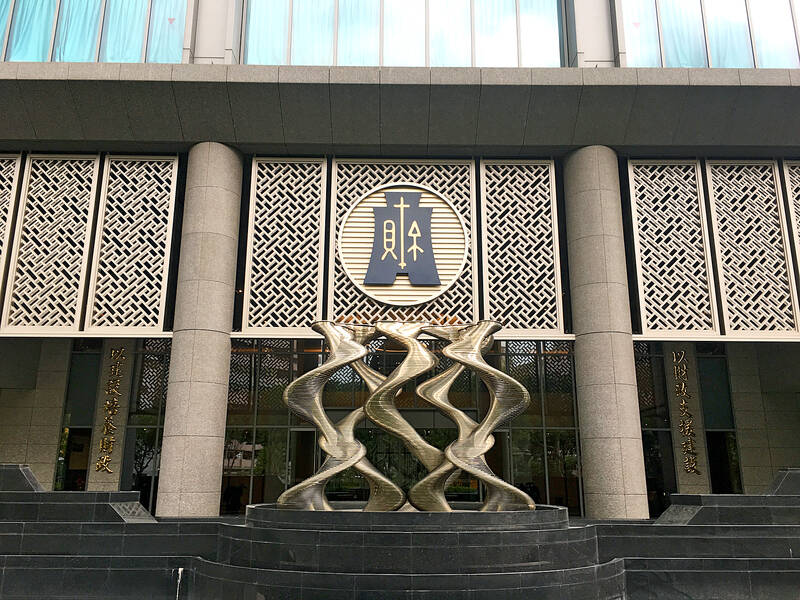Taiwan’s tax revenues declined year-on-year last month, driven by sharp drops in stock market turnover and property transactions, as consumer and investor sentiment was dampened by concerns over US tariffs and the central bank’s tightened credit controls, the Ministry of Finance said yesterday.
The national treasury collected NT$154.1 billion (US$5.08 billion) in tax revenue last month, down 3.1 percent from a year earlier, primarily due to a 31 percent drop to NT$17.8 billion in securities transaction tax revenue, ministry statistician Liu Shun-rong (劉訓蓉) said.
“Wild market volatility drove investors to the sidelines following an unprecedented stock rout on April 7 and a sharp rebound on April 10,” Liu said.

Photo: Clare Cheng, Taipei Times
The turbulence was triggered by US President Donald Trump’s announcement of “reciprocal” tariffs on specific countries, which sparked a global equities selloff, Liu said, adding that Trump later declared a 90-day pause in an attempt to calm market jitters.
Daily turnover on the local main board averaged NT$338.1 billion last month, a slump of 33.7 percent from NT$509.7 billion a year earlier, the ministry said.
Real-estate activity also weakened, with land value increment tax revenue falling 28.3 percent to NT$5.4 billion, and deed tax revenue dropping 27.1 percent to NT$1.2 billion, it said.
In addition to the negative wealth effect, the central bank’s ongoing credit controls continued to weigh on buying interest, Liu said.
Meanwhile, corporate income tax revenue entered negative territory, which Liu attributed primarily to major tax refunds.
Cumulative tax revenues in the first four months of the year fell 1.2 percent year-on-year to NT$708 billion, falling short of the government’s budget target by 2.3 percent, the ministry said.
That came as land value gains tax revenue in the first four months dropped 13.8 percent annually to NT$25.1 billion, while deed tax revenue declined 16.8 percent to NT$4.9 billion over the same period, it said.
Securities transaction tax revenue also slipped 15 percent to NT$74.8 billion over the same period, it added.

To many, Tatu City on the outskirts of Nairobi looks like a success. The first city entirely built by a private company to be operational in east Africa, with about 25,000 people living and working there, it accounts for about two-thirds of all foreign investment in Kenya. Its low-tax status has attracted more than 100 businesses including Heineken, coffee brand Dormans, and the biggest call-center and cold-chain transport firms in the region. However, to some local politicians, Tatu City has looked more like a target for extortion. A parade of governors have demanded land worth millions of dollars in exchange

Hong Kong authorities ramped up sales of the local dollar as the greenback’s slide threatened the foreign-exchange peg. The Hong Kong Monetary Authority (HKMA) sold a record HK$60.5 billion (US$7.8 billion) of the city’s currency, according to an alert sent on its Bloomberg page yesterday in Asia, after it tested the upper end of its trading band. That added to the HK$56.1 billion of sales versus the greenback since Friday. The rapid intervention signals efforts from the city’s authorities to limit the local currency’s moves within its HK$7.75 to HK$7.85 per US dollar trading band. Heavy sales of the local dollar by

Taiwan Semiconductor Manufacturing Co’s (TSMC, 台積電) revenue jumped 48 percent last month, underscoring how electronics firms scrambled to acquire essential components before global tariffs took effect. The main chipmaker for Apple Inc and Nvidia Corp reported monthly sales of NT$349.6 billion (US$11.6 billion). That compares with the average analysts’ estimate for a 38 percent rise in second-quarter revenue. US President Donald Trump’s trade war is prompting economists to retool GDP forecasts worldwide, casting doubt over the outlook for everything from iPhone demand to computing and datacenter construction. However, TSMC — a barometer for global tech spending given its central role in the

An Indonesian animated movie is smashing regional box office records and could be set for wider success as it prepares to open beyond the Southeast Asian archipelago’s silver screens. Jumbo — a film based on the adventures of main character, Don, a large orphaned Indonesian boy facing bullying at school — last month became the highest-grossing Southeast Asian animated film, raking in more than US$8 million. Released at the end of March to coincide with the Eid holidays after the Islamic fasting month of Ramadan, the movie has hit 8 million ticket sales, the third-highest in Indonesian cinema history, Film